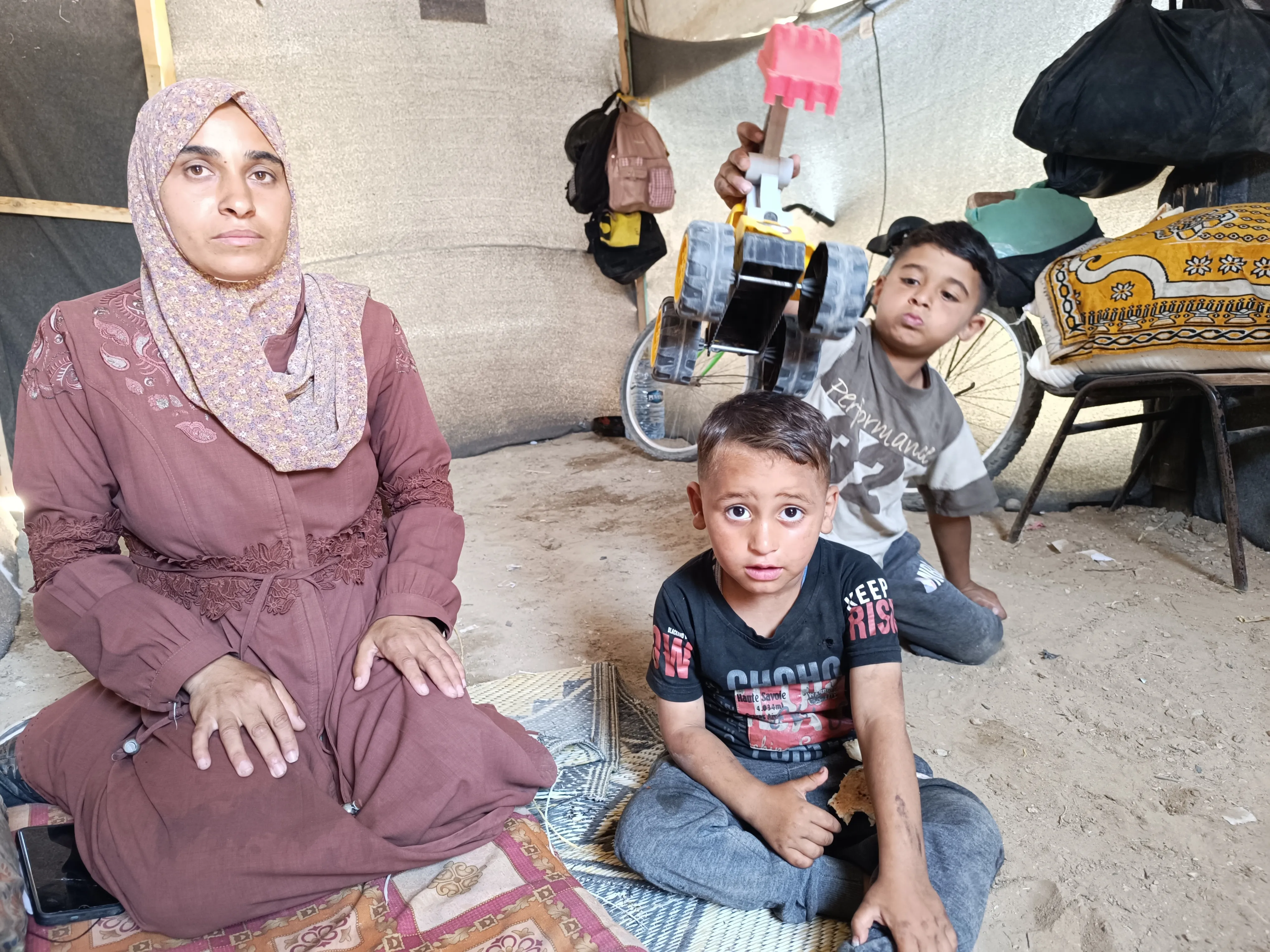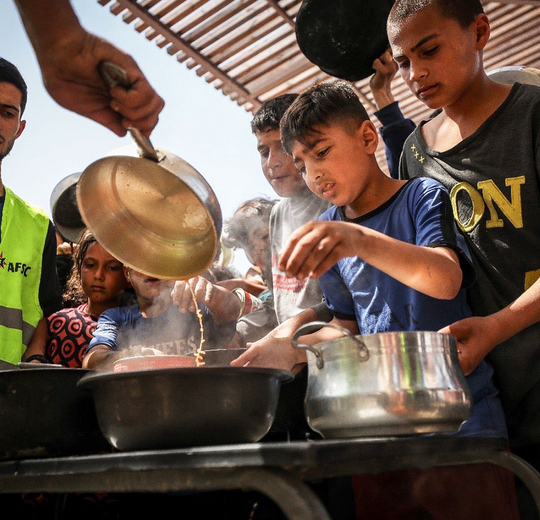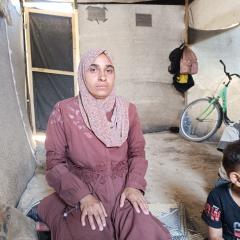My name is Fidaa Abdullah Al-Shakhreet, I am 32 years old, from Beit Hanoun. On the fifth day of the war, my husband was martyred. I have now become both a mother and a father to my children.

"I do not feel safe anywhere in the Gaza Strip. There is no safety for me and my children. Every day, we are exposed to heavy shelling near the displaced tents. Fear for my children's safety accompanies me constantly. Everything around us reminds us that we are exposed to death at all times."
My husband was martyred on the fifth day of the war.
I used to live with my husband and our three children in a simple house in Beit Hanoun, the northern most part of the Gaza Strip. Life before the war was difficult, but we were happy to be together. We evacuated on the first day of the war as our house was close to the border with the 1948 lands. The occupation killed my husband on the fifth day of the war, leaving me with the responsibility of raising three children alone.
I married Saeed Muayyin Al-Shakhreet seven years ago. Allah blessed us with three children: Zainab, six years old; Abdullah, four years old, and the youngest, Razan, who is only one year old. Our house was near the Erez Israeli military checkpoint. Our journey of suffering began on the first day of the war and has continued for almost eight consecutive months.
When the Israeli war on Gaza began on 7 October 2023, my family and I fled to UNRWA schools in Beit Hanoun. As the bombing intensified, we moved to other schools-turned-shelters in Jabalia camp. After my husband was martyred, we stayed in Jabalia camp for a week longer. Our suffering intensified after my husband’s martyrdom.
I stayed with my children in the Jabalia camp schools for a week. As Israeli airstrikes intensified, we fled to Nuseirat camp in the central Gaza Strip. The 30-kilometre [18.6-mile] journey of displacement was exhausting. Having lost my husband, I was alone with my children. There is no one to help us in this fierce war.
We lived in tents at Mumdhuh Saeedam School in Nuseirat camp for more than two months until, in the beginning of January, the occupation forces issued evacuation notices. I took my children to Deir al-Balah city, searching for a place to live in schools, but found none. We slept in the open air for several days, enduring severe cold. My children fell ill during this period.
Residents of Deir al-Balah helped me set up a tent for me and my children. We’ve now been living in this tent for five consecutive months in a camp for displaced people in the Al-Bassa area west of Deir al-Balah city. Conditions are extremely difficult; we lack the bare necessities of life – food, water, and daily needs. Life in the tents is painful and harsh, and we have never gotten used to it. Harmful insects fill the tents. During winter, we endured severe cold. Water fills our tents during the rain. Now, we suffer from extreme heat and high humidity inside the tents.
On the fifth day of the Israeli war on Gaza, 11 October 2023, my husband went to inspect our house in Beit Hanoun city. I asked him not to go because the Israeli bombing was heavy. We were living in schools-turned-shelters in Jabalia camp without clothes, food, or water.
My husband went to our house with his uncle and brother to bring us necessities. They risked their lives to provide for us, even in that difficult situation.
My husband, his uncle, and his brother entered our house, and the occupation forces bombed it, destroying it. They were martyred instantly, and many of our relatives are still missing under the rubble of our destroyed houses in Beit Hanoun city. My husband, his uncle, and his brother were buried in the cemeteries of Jabalia camp, away from our houses and Beit Hanoun’s cemetery, where we used to bury our relatives.
I couldn’t comprehend that my husband had become a martyr and that I would live the rest of my life as a widow, now responsible for raising three children alone. This news was shocking and painful. My husband, Saeed, was a man whom I loved and who loved me. We lived together for seven years, during which we formed our small family – I don’t know how I will continue my life without him. Our displacement journey for nearly eight months has only added to my suffering. I have become both a mother and a father to my children.
Life inside the tents is extremely difficult. We have no water, and the temperatures are unbearably high. There are no places for our children to play, and the area lacks cleanliness. We have no lighting at night and sleep in complete darkness. We try to finish all our tasks before darkness falls. We have been living in tents for almost eight months, but we have never adapted to tent life.
We suffer from many harmful insects and other animals in and around the tents, including scorpions, snakes, flies, and mosquitoes. We experience influenza, allergies, and colds due to fluctuating temperatures, with extreme heat during the day and cold at night. We have no water to maintain our hygiene or the personal hygiene of our children. The situation is difficult in every way.
We rely on fire to prepare food. We cook canned food obtained from UNRWA, receiving a small food basket every week to ten days. I feed my children small pieces of candy to pacify them until I can prepare a meal. We eat only one meal a day, either breakfast or lunch. We do not have enough food for two or three meals a day as we did before the war. We try to survive with what little food we have.
Out of necessity, I sell canned goods to have some money to buy food for my children. I go out daily in search of work but cannot find any. I walk several kilometres searching for firewood to cook food and sometimes manage to find a little, but mostly I don’t. All displaced people search for wood and endure the same suffering, but I am now a mother and father. There is no one to help me, no one to stand by my side. I lost my support and my husband on the fifth day of the war.
We thought living in tents would be safe, believing that the Israeli shelling would be confined to areas designated by the occupation forces. We flee based on their instructions. But wherever we go, we are pursued by shelling. Death stalks us around the clock. The shelling is everywhere, and fear has accompanied us since the first day of the war.
A mosque adjacent to the displaced peoples camp we live in, in Deir al-Balah city, was bombed. Rocket shrapnel and rubble fell on our tents, injuring my neighbours and significantly damaging our tent. My children and I survived the Israeli bombing.
I do not feel safe anywhere in the Gaza Strip. There is no safety for me and my children. Every day, we are exposed to heavy shelling near the tents. Fear for my children’s safety accompanies me constantly. Everything around us reminds us that we are exposed to death at all times.
If we do not die from Israeli missiles, death threatens us with scorpion stings, snake bites, or the diseases we suffer from in this miserable life. Death stalks us at all times. I try to protect my children and keep them safe. They are my husband’s trust to me, but what is happening in Gaza in this war is beyond my capabilities. This war is very harsh, and we have never seen anything like it before.
Since the first day of our marriage, my husband and I agreed to work hard to provide a decent life for our children. But today, my husband has become a martyr; the occupation killed him and destroyed our house completely. We have been living in tents for nearly eight months, but my dream of providing a decent life for my children is still alive, and I will work hard to preserve the trust of my martyr husband.
I dream of completing my children’s education and providing them with a decent life. I dream of them living a safe life away from risks. I am now solely responsible for them, which is a great responsibility for a young woman. I have turned from a bride into a mother without a husband, but I will protect my children. I hope the war will end soon, that I will be able to rebuild my house, and that the daily killing we are experiencing in this war will stop. I would be ready to live in a tent on my destroyed house. The day I return to my house and the day I visit my husband’s grave will be the best days of my life.
Take action now
Tell Congress to demand lifesaving aid for Gaza
The humanitarian crisis in Gaza has reached catastrophic levels. Since March 2, 2025, Israel—with full support from the U.S.—has severely restricted food, water, medicine, and humanitarian aid from entering Gaza.
Contact
If you have questions or concerns, please contact us at gazaunlocked@afsc.org.


